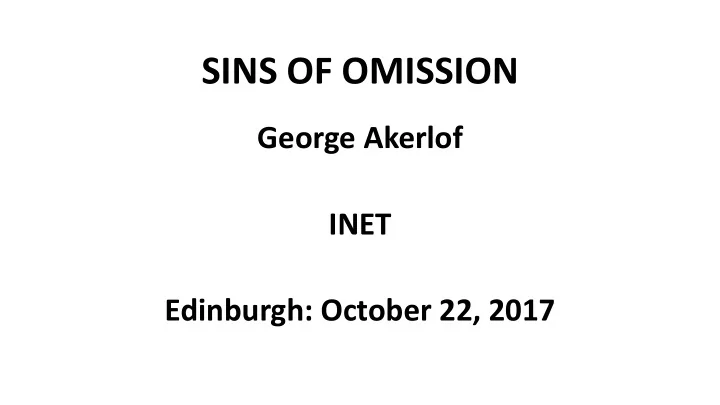

SINS OF OMISSION George Akerlof INET Edinburgh: October 22, 2017
MISCONCEPTION Misconception of the field. “Scientific Method”: Simple models Statistical analysis.
MULTI-TASKING PROBLEM Such exclusionary definition: Dangerous multi-tasking problem. Incentivizes attention: To problems Easy to pursue . D e-incentives attention: Against problems Difficult to pursue .
SUMMARY Full domain of economic research: Simple-modeling, statistical analysis. Important economic and social problems: Not covered by economists’ research.
MOTIVATION Standard motivations: Maximize utility, profits. Broader view: People motivated by the STORIES they are telling themselves at the time they are making their decisions. Much richer range than economists’ a priori assumptions.
CORE OF SOCIOLGY Core of sociology: Ethnography. Ethnographies uncover: Stories. Social networking that generates those stories. Economists’ restricted range of stories: Major example of sins of omission.
Second Example: Sins of Omission Financial Crisis of 2008. Rajan: Finance, real estate and macroeconomics. Caballero: Macro models—“Core” and “Periphery.”
Core: DSGE (Dynamic Stochastic General Equilibrium) model. Simple a priori assumptions at many nodes of choice. There is: considerable Peripheral macro and finance literature. Deviations from Core: Only one at a time.
THEORY: COULD NOT WORK Caballero: “The Periphery is about isolating specific mechanisms. [Therefore] it surrounds the sources of these mechanisms with assumptions designed to kill unwanted effects that would pollute the message.” Financial Crisis: Interactions beyond one-at- a-time deviations.
STATISTICAL APPROACH: WOULD NOT WORK SIFI’s: Financial intermediaries of size/position so that adverse shock may lead to fire-sale crash. Danger zones due to tail risks: Taken on to artificially increase current profits; Taken on to gamble for resurrection; Due to Miscalculation; Due to Over-optimism.
Statistical Analysis: Limited Data rare: Only involves tail-risk SIFIs. Rarer still: Risk-taking managers hide vulnerabilities. Need for more forensic view of evidence. Economists: Limited incentives to predict financial crash.
MORE GENERAL THEORY Brock and Durlauf: Convergence of belief due to desire to conform. Myself and Michaillat: Biases in publication/ promotion-to tenure. Research methodology: Converges to “Do-What-I-Do.”
CONCLUSION Everyone here: Your own examples. INET: HUGE role. Expanding domain of economic research.
THANK YOU!!!
Recommend
More recommend